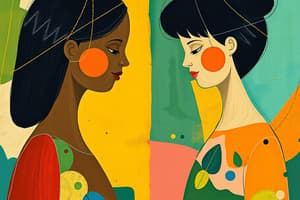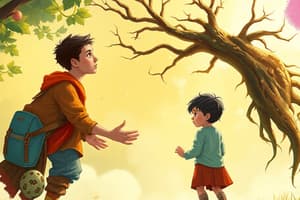Podcast
Questions and Answers
What is the process by which people learn the characteristics of their group?
What is the process by which people learn the characteristics of their group?
- Childhood
- Socialization (correct)
- Nature
- Nurture
What does 'nature' refer to in the context of socialization?
What does 'nature' refer to in the context of socialization?
The characteristics that people inherit genetically.
What does 'nurture' refer to?
What does 'nurture' refer to?
The characteristics that result from one's interaction with others in the human, social environment.
What are feral children?
What are feral children?
What are isolated children?
What are isolated children?
What characterizes institutionalized children?
What characterizes institutionalized children?
What is a key element of childhood in the context of socialization?
What is a key element of childhood in the context of socialization?
Who concluded that the self is socially created?
Who concluded that the self is socially created?
What is the looking glass self?
What is the looking glass self?
Who emphasized play as crucial to the development of self?
Who emphasized play as crucial to the development of self?
What do agents of socialization include?
What do agents of socialization include?
What is concerted cultivation?
What is concerted cultivation?
What is natural growth in parenting?
What is natural growth in parenting?
How does religion influence individuals?
How does religion influence individuals?
What is the role of education in socialization?
What is the role of education in socialization?
What defines a peer group?
What defines a peer group?
What is a food desert?
What is a food desert?
What is social class?
What is social class?
What factors affect life chances?
What factors affect life chances?
What is structural mobility?
What is structural mobility?
What does the culture of poverty suggest?
What does the culture of poverty suggest?
What are strong ties in social networks?
What are strong ties in social networks?
What are loose ties in social networks?
What are loose ties in social networks?
Flashcards are hidden until you start studying
Study Notes
Socialization
- Definition: Process of learning group characteristics including knowledge, values, attitudes, skills, and behaviors deemed appropriate.
- Agents: Family, religion, education system, peer groups, and mass media significantly influence socialization.
Nature vs. Nurture
- Nature: Inherited genetic characteristics impacting individual traits.
- Nurture: Characteristics shaped by interactions with others in social environments.
Childhood Development
- Importance: Critical stage for socialization, heavily reliant on language for human development.
- Feral Children: Children raised in isolation by animals, lacking human contact, impacting their social skills.
- Isolated & Institutionalized Children: Lack of human interaction results in developmental challenges.
Theories of Self
- Charles Cooley: Emphasized the self as socially created through interactions, introducing the "looking glass self" conceptual framework.
- Looking Glass Self Process: Involves imagining appearance to others, interpreting their reactions, and developing a self-concept.
- George Mead: Highlighted play's role in self-development, encouraging children's ability to adopt others' perspectives.
Socialization Contexts
- Family Influence: The primary socialization agent with lifelong effects.
- Concerted Cultivation: Middle/upper-class parenting style focused on developing children's talents via organized activities.
- Natural Growth: Working-class children enjoy unstructured playtime with familial interactions.
Economic and Social Class Dynamics
- Life Chances: Economic resources shape opportunities for education, healthcare, and employment.
- Economic Inequality: Significant class differences influence various life choices such as marriage and retirement.
- Food Deserts: Areas with limited access to nutritious food; socio-economic factors contribute to such disparities.
Social Class Definitions
- Weber's Perspective: Class based on property, prestige, and power.
- Marx's View: Society divided into capitalists (bourgeoisie) and workers (proletariat) based on production means ownership.
Wealth Distribution
- Wealth Concentration: 70% of U.S. wealth owned by 10% of families; wealth disparity correlates with opportunity inequalities.
Social Mobility
- Types:
- Intergenerational Mobility: Class changes among family generations.
- Upward/Downward Mobility: Movement up or down the class ladder.
- Structural Mobility: Movement due to societal structural changes rather than individual efforts.
Structural Factors in Poverty
- Social Structure: Features like systemic racism and gender discrimination affect opportunity availability.
- Culture of Poverty: Distinct values and behaviors among the poor perpetuate their situation across generations.
Concepts of Capital
- Old Money: Legacy wealth enhances family prestige; children socialized into elite circles.
- New Money: Recently acquired wealth lacking the social connections of established upper classes.
- Physical, Human, Cultural, Social Capital: Different forms of resources crucial for economic success and social mobility; include material tools, skills, and networks.
Social Networks
- Strong Ties: Close, reliable relationships providing support.
- Loose Ties: Connections fostering social mobility that may not involve close personal relationships.
Studying That Suits You
Use AI to generate personalized quizzes and flashcards to suit your learning preferences.




